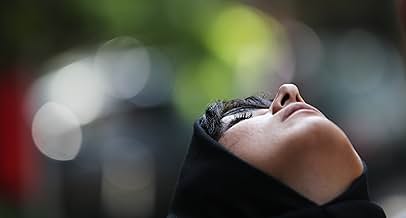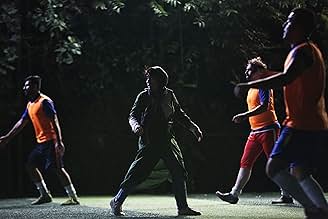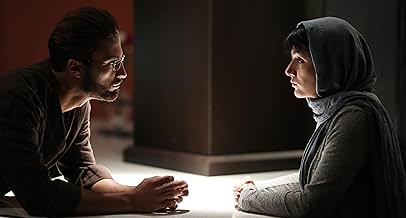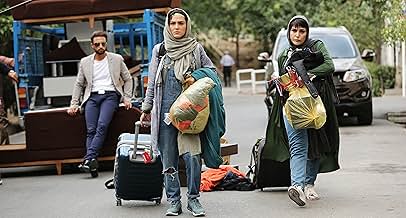Araghe Sard
- 2018
- 1 h 28 min
AVALIAÇÃO DA IMDb
6,1/10
1,4 mil
SUA AVALIAÇÃO
Adicionar um enredo no seu idiomaAfrooz is the captain of the women's futsal team in Iran. After 11 years of hard work, Iran is in the final of the Asian Nations Cup. But when she embarks for Malaysia, she learns that her h... Ler tudoAfrooz is the captain of the women's futsal team in Iran. After 11 years of hard work, Iran is in the final of the Asian Nations Cup. But when she embarks for Malaysia, she learns that her husband forbids her to leave the territory.Afrooz is the captain of the women's futsal team in Iran. After 11 years of hard work, Iran is in the final of the Asian Nations Cup. But when she embarks for Malaysia, she learns that her husband forbids her to leave the territory.
- Prêmios
- 5 vitórias e 16 indicações no total
Enredo
Você sabia?
- CuriosidadesSoheil Beiraghi's 2nd feature film.
Avaliação em destaque
Saw this at the Movies That Matter film festival 2019 in The Hague. Very powerful movie, well-told story, perfectly illustrating inequality between men and women as per current laws in Iran, and also showing that women football is deemed to be of a lower level than male football. The latter even so applies in our part of the world, so no reason to be condescending about Iran for this part of the plot.
The bad guy in this movie is the husband, who is very stubborn in forbidding his (ex)wife to get a real divorce. He is also very creative in finding nasty means to get her back. One of his methods is to refuse permission to let her travel abroad. He has allowed her football career for many years, and they live now separated for one year already. What the husband really wants to achieve with this travel ban, I deduce from the proceedings, is that he wants to prolong their marriage and to resume living together again. Their struggle around the travel ban is even put before a legal court. We get the feeling that the judge was inclined to rule in her favor, but the law stood in the way. The husband, having the last word, was not prepared to give in anything.
It is important to note that this movie successfully passed Iranian censorship, something that we could have derived (if we'd known) from the words "In the name of God" appearing after the opening credits. Lately it became news that one Iranian cinema chain banned the movie, though for a reason we deem trivial (something to do with her flat mate; details escaped me). One can speculate that Iran allows a movie like this to be seen in their own country as well as in the rest of the world, if only to show that they are open to many contemporary issues and are reasonably liberal in letting women act on fields that were previously reserved for men only.
Several issues in this struggle are shown by means of a well-written story with believable characters. It also shows, between the lines, that Iran is a modern, civilized sountry, with streets and houses looking very much like streets and houses in our side of the world. Of course, we see scarfs everywhere, and many women dressed in black. I've seen many other Iranian movies, some passed censorship and others smuggled out of the country, but overall the modern, civilized image of Iran prevails. Whatever we may find about their emphasis on religion and the impact of related rules, Iran has by far surpassed the status of a developing country.
The final Q&A covered two main topics, namely inequality between men and women in Iran, and inequality in sports in Iran and elsewhere. Football is the best-known example of the second issue. I was not aware beforehand that it was so bad as told here by a former football player. With other sports, male and female competitions can run at the same time, but that is never the case with football and major football competition events always run in different locations and at different times. It seems to be related with football regarded as a typically manly game. It strengthened that image since the first woman liberation movement, many years ago, and maintained that until nowadays. For other sports, the male-female separation is not and never has been so severe as it was and still is for football. So, you learn something new every day.
The bad guy in this movie is the husband, who is very stubborn in forbidding his (ex)wife to get a real divorce. He is also very creative in finding nasty means to get her back. One of his methods is to refuse permission to let her travel abroad. He has allowed her football career for many years, and they live now separated for one year already. What the husband really wants to achieve with this travel ban, I deduce from the proceedings, is that he wants to prolong their marriage and to resume living together again. Their struggle around the travel ban is even put before a legal court. We get the feeling that the judge was inclined to rule in her favor, but the law stood in the way. The husband, having the last word, was not prepared to give in anything.
It is important to note that this movie successfully passed Iranian censorship, something that we could have derived (if we'd known) from the words "In the name of God" appearing after the opening credits. Lately it became news that one Iranian cinema chain banned the movie, though for a reason we deem trivial (something to do with her flat mate; details escaped me). One can speculate that Iran allows a movie like this to be seen in their own country as well as in the rest of the world, if only to show that they are open to many contemporary issues and are reasonably liberal in letting women act on fields that were previously reserved for men only.
Several issues in this struggle are shown by means of a well-written story with believable characters. It also shows, between the lines, that Iran is a modern, civilized sountry, with streets and houses looking very much like streets and houses in our side of the world. Of course, we see scarfs everywhere, and many women dressed in black. I've seen many other Iranian movies, some passed censorship and others smuggled out of the country, but overall the modern, civilized image of Iran prevails. Whatever we may find about their emphasis on religion and the impact of related rules, Iran has by far surpassed the status of a developing country.
The final Q&A covered two main topics, namely inequality between men and women in Iran, and inequality in sports in Iran and elsewhere. Football is the best-known example of the second issue. I was not aware beforehand that it was so bad as told here by a former football player. With other sports, male and female competitions can run at the same time, but that is never the case with football and major football competition events always run in different locations and at different times. It seems to be related with football regarded as a typically manly game. It strengthened that image since the first woman liberation movement, many years ago, and maintained that until nowadays. For other sports, the male-female separation is not and never has been so severe as it was and still is for football. So, you learn something new every day.
- JvH48
- 26 de abr. de 2019
- Link permanente
Principais escolhas
Faça login para avaliar e ver a lista de recomendações personalizadas
Detalhes
Bilheteria
- Faturamento bruto mundial
- US$ 89.043
- Tempo de duração1 hora 28 minutos
- Cor
- Mixagem de som
- Proporção
- 2.35 : 1
Contribua para esta página
Sugerir uma alteração ou adicionar conteúdo ausente

Principal brecha
By what name was Araghe Sard (2018) officially released in Canada in English?
Responda
![Assistir a Trailer [English SUB]](https://m.media-amazon.com/images/M/MV5BZTYyMWY1MTEtNDQ4ZC00ZTk1LWIxMzMtYWQ4ODUwYTYyZWE2XkEyXkFqcGdeQXRyYW5zY29kZS13b3JrZmxvdw@@._V1_QL75_UX500_CR0)










